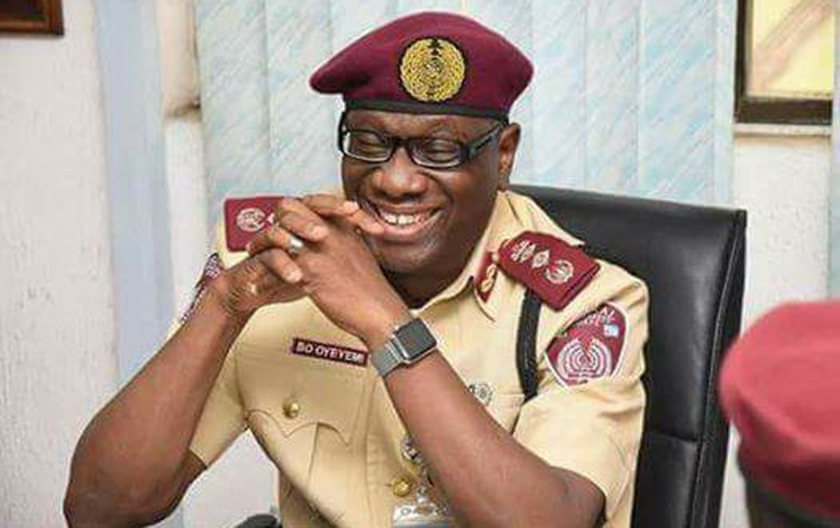The Corps Marshal of the Federal Road Safety Corps (FRSC), Dr. Boboye Oyeyemi remains a reporter’s delight anytime, any day, as he is always ready to entertain questions, even those that are difficult and sensitive. He had a chat recently with some journalists in Abuja, including Frank Kintum
Going by the high of number road accidents ascribed to speed, will it not be right to say the FRSC crusade of encouraging motorists to install speed limiting device in their vehicles has failed?
That is the matter of the moment. This year is the year of enforcement and full compliance with the speed limiting device. We’ve seen from the data that 52 per cent of the accidents recorded in Nigeria today are speed-induced crashes. Innocent people are dying. And many of them are lone crashes. Why? The roads are getting better. For instance, the Lagos-Ibadan expressway, the completed portions look like runway to motorists. People go on testing the capacity of their vehicles. And you know road traffic crash requires just the minutest fraction of a second of lack of concentration; just changing a CD and running into a pothole without having a firm grip on the steering could take the moving vehicle up and result in a serious accident. And because of the speed, it has turned into an aircraft taking off. Vehicles and aircraft move in the same way. The only difference in the aircraft is that the lever is lifted and it takes off and continues. Tyre blowout will make the vehicle to be lifted but because there is no mechanism to propel it up, it comes down and continues; it somersaults either vertically or horizontally. That is why 52 per cent accounts for road crashes in the country today.
The FRSC management has taken a decision to focus on this. We have already given instructions to the field commands to commence full enforcement and compliance with the installation of the speed limiting device. There are more than enough registered speed-limiting device vendors; the prices have crashed because it is being manufactured in Nigeria. The technology has been transferred. There is no going back. I must commend the organized transport sector such as the ABC, God is Good and those that have complied. The problem has to do with commercial drivers. They are the ones carrying the larger members of the public. We need to address this first.
This first quarter, we have raised the level of awareness; even all my activities from the beginning of the year have been focused on the speed limiting device. In my address for the end of the year review, the key thing I focused on was the speed limiting device. Let’s commend the government; the roads are getting better nationwide Lagos-Ibadan road will be completed this year; the Second Niger Bridge construction has gone far; Enugu-Awka-Onitsha is under full reconstruction; Enugu-Port Harcourt; Abuja-Kaduna-Kano; Kano-Maiduguri are undergoing construction.
The presidential directive on the device was 2016; that is six years ago. We must be serious about the compliance. Ideally, we should be getting to about 98 per cent compliance level now and start looking at getting the private vehicle owners to comply. But we have not got the expected level of compliance from the commercial drivers. All this has to do with lives of human beings. If we don’t do it, we’re in trouble.
What is the penalty for failure to install the speed limiting device?
We are still a bit humane for this period. If you don’t install, your vehicle is impounded. You will go to the authorized vendor, pay the prescribed fee and the vendor will come and install it in your vehicle. There is a portal to check those that have complied. The patrol team only needs to check to verify. We will continue to engage the NURTW and other transport unions for full compliance. I must commend the multinationals such as the Nigerian Breweries, Guinness and Dangote; they have complied. Dangote has a fleet of over 7,000 vehicles and they have complied.
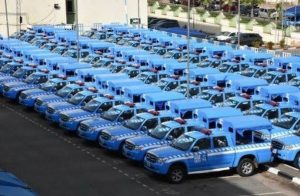
How will you access the infrastructural support from the government to the FRSC in the last seven years?
This regime since 2015 has been very supportive. First, in 2016, they approved intervention funds that led to the procurement of about 343 vehicles. There was another approval in 2020, which we are working on now to inject more vehicles to support the operations of the Corps. On infrastructure, this is the administration that has devoted most support for the FRSC in terms of release of funds for infrastructural development. Within the seven and a half years, we have constructed, inaugurated and equipped 16 state sector commands. All the abandoned projects in the academy have been fully completed. We now have the four training institutions running; for the Road Marshal Assistants, we have the training school in Jos, to be relocated soon to Shendam. For the Marshal Inspectorate, that was the one inaugurated by Vice-President Yemi Osinbajo last year, which was built for the Corps by the people and government of Delta State. All the infrastructure in our academy has been fully completed. We have received the approval of the National University Commission to commence post-graduate degree programmes. All the facilities required for the training of cadets at the post-graduate school are on the ground. My focus when I came on board was infrastructural development. Every landlord continues to increase their rent. This affects our projections. With these 16 offices fully built, we are out of rent payment. We appreciate Mr President for providing the funds for the projects. We are landlord on our own now. And these are strategic structures in different parts of the country.
Why do you have the same number plate for motorcycles and tricycles?
The Joint Tax Board has just approved the use of single vehicle number plate for tricycle. This will soon come on board.
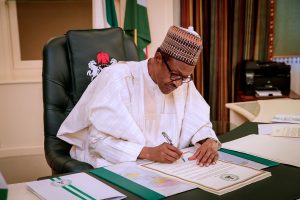
Why did FRSC fail in the enforcement of helmets for motorcycle riders?
We did not fail. We have to slow down a bit. When implementing, we met a brick wall in terms of religious and cultural issues. Many of our staff members were physically assaulted and some were killed. So we have to review the situation and be strategic in our implementation. You don’t expose your personnel to such dangers. But now the United Nations is calling for the wearing of safety helmets. It is an approach that we must be tactical about. We will start reaching the unions again. And they have different factions. It requires a tactical approach today because of this cultural issue. It is normal; when you see things that can threaten the peace of the country in implementing a programme, you slow down and review the strategy. But riding a motorcycle without wearing the helmet is like the rider has signed a death warrant. Majority of the injuries from the accidents are head injuries. When government of Lagos State, for instance, banned okada on major roads, the crash rate dropped drastically. Okada riders’ nuisance value is high and worrisome. They are violent and aggressive. And you can’t blame them. They are mostly graduates who are bottled up. They are unemployed people who saw okada as a means of sustaining their family. That is why I said we must be strategic when enforcing the compliance. Most of the states have banned them from the urban areas and restrict them to the fringes. The Highway Code/traffic regulations do not permit motorcycles and tricycles to be on the expressway. And this is one area the Minister of Works and Housing has requested us to do the enforcement.
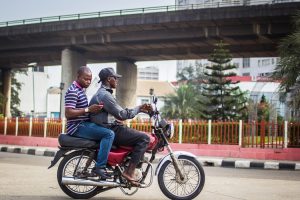
And why do we have okada? It is the crisis in our public transportation system that brought okada. If the state governments had implemented the resolutions of the National Council on Works and National Council on Transportation to provide and sustain high-capacity buses for public transportation, okada would not have been there. That is why we have appealed to the state governments to address the issue of transportation by providing high-capacity buses for commercial transport. Also, states that have the facility to provide inter-modal system should also do this in order to reduce the pressure on the road.
What can be done to ameliorate the frequent tanker accidents on highways?
The frequency is not as alarming as it seems. The data last year is not as high as in the previous year. I must commend the leadership of NUPENG-PTD for this. The issue is that once there is a crash involving a tanker, the situation is worrisome; it usually leads to monumental losses. There was one tanker explosion at a village after Gboko, Benue State, last year; it almost razed the whole village because it was during the dry season.
We have carried out about six studies on why tanker accidents occur on the Otedola Bridge in Lagos; the last one was directed by the Honourable Minister of Works and Housing (Babatunde Fashola). The studies show that there are no engineering defects on the bridge. There was no problem. It’s just that all those tankers are over 30 years. They are aged. We have again seen that most of those tankers were not designed to be pulling 60,000 litres of petroleum products. There is a serious axle load violation. A tanker used to be designed for 33,000 litre product; later it was reviewed to maximum load of 45,000 litres. Now, you see these tankers carrying 60,000 litres, 75,000 litres. NUPENG even told us that some carry 99,000 litres on a road designed for 33,000 litres. This is why our roads do not last up to the expected time. When some of these trucks are climbing, the capacity of the heads cannot pull the load they carry; they end up drawing back and eventually hit the concrete.
Some of the trucks are even designed for oil rigs but they got converted to carry fuel on the highways. There is an agency that is supposed to certify the tankers before allowing them to carry petroleum products. When agencies concerned are not doing what they are expected to do effectively, this is the price the nation pays. The absence of weighbridges on our roads led to this abuse. The same thing with the trailers; a trailer that is supposed to carry 600 bags of cement is seen carrying 1,000 bags of cement. The pressure is on the road. That is why we are working with the Federal Ministry of Works to make sure that the weighbridges are brought back. It is part of the decisions of the National Council on Works that even if we cannot have the full weighbridges, let us have the mobile weighbridges. And randomly, you stop those trucks and check them.
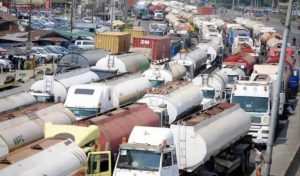
But why has the FRSC not been able enforce the compliance by tanker drivers violating the regulations?
Enforcement is a collective responsibility. If you observe when we started dealing with operators of unlatched trailer beds, they stopped travelling in the day time. In three months, we impounded over 3,000 trucks and prosecuted them at mobile courts. In Lagos, they started going through Ikorodu and Ota; they abandoned the expressway. We pursued them. Our advocacy, enlightenment and education with the enforcement are working; at least, there is respite. The key issue now is the compliance with the axle load specification by the articulated vehicles. If there are no weighbridges, the mandatory period the roads are supposed to last will not be achieved. That is why weighbridges and toll plazas are coming back. The minister of works has said so. FEC has approved it. If we have toll plazas, we automatically will have weighbridges. The law is very firm; you must weigh your load and if there is excess, you warehouse it. The toll plaza is also for security administration. It will also bring revenue to the government to maintain the roads.
You now use Dr as an appellation before your name these days. Is your doctorate honorary or academic?
Mine is not honorary; it is academic.
How did you study for a doctoral degree when you are still active in service?
I started the doctoral degree programme in Yola in 2002. I deferred it; went back and completed it. I defended it with my seminar papers. Doctorate is the simplest programme to do. Once you can finish the course work, the seminars can be done at your own time. In my own case, all that I did were road safety-related. You can commission people to get data for you and you do your analysis, proposition and move on.


